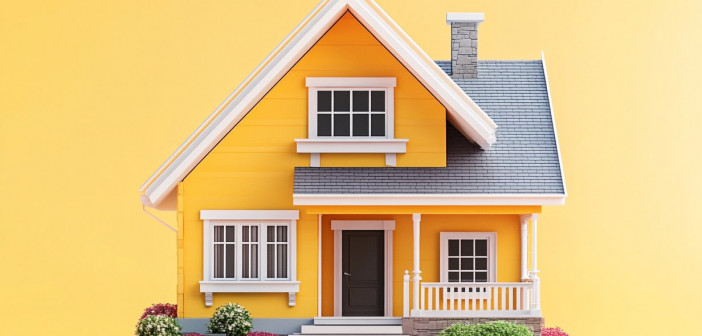The answer depends on when you’ll move next and where you’ll get your down payment.
It’s been a couple of tough years for homebuyers. Interest rates have climbed, inventory has tightened and housing prices keep going up in many areas. During the past five years, home values have climbed more than 45%, according to Zillow, about twice the rate of typical market growth.
While there are some signs that the market is turning in buyers’ favor – Realtor.com notes the number of homes actively for sale is up 30% compared to last year – waiting to buy a house is no guarantee of bargains.
“There’s not enough inventory to meet market demand,” according to Amanda Rogers, owner/broker of Rogers Neighborhood Realty in Lowell, Michigan. “We’re also seeing some bidding wars happening again.”
So is it better to rent or buy in 2025?
“People really need to speak with a real estate professional,” says Bill Kowalczuk, a broker with Coldwell Banker Warburg in New York City. They will be best able to evaluate a person’s situation and local market conditions.
But in the meantime, you can use this decision guide to start thinking about whether you should buy or rent a home this year.
The Case for Renting
“The cost-benefit analysis in 2025 seems to really favor renting,” says Branden Lombardi, president of BB Living, which has developed communities in five states. These communities all feature single-family homes for rent with three to four bedrooms each.
With mortgage rates relatively high, affordability has become a significant issue for many families, and renting may be more financially feasible.
In general, renting can make sense in the following situations:
- You aren’t sure where you want to live long term.
- You don’t want the hassle of maintenance.
- You want lower monthly payments.
- You would rather invest cash than build equity.
You aren’t sure where you want to live long term.
Renting is ideal for those who need a place to stay for only a year or two. Buying and selling a house can be a long process, but moving out of a rental can be done quickly and with minimal expense.
Even if you think you might want to live in an area for an extended period, it might make sense to rent before buying. “Renting gives you a really great opportunity to get to know a city,” Lombardi says.
You don’t want the hassle of maintenance.
One key benefit to renting is that you aren’t responsible for the building upkeep or maintenance within your unit. There is no lawn to mow and no sidewalk to shovel. If an appliance breaks or the furnace gives out, it’s your landlord’s problem, not your expense.
“If you’re looking for lack of responsibility, you’d still be better off buying a condo,” Rogers suggests. The exterior maintenance of common areas is often paid by the condo association, while interior maintenance is the responsibility of owners. While not as hassle-free as renting, purchasing a condo can eliminate some household responsibilities.
You want lower monthly payments.
One of the most compelling reasons to rent rather than buy right now is the cost savings.
“Even if the rent is astronomically high, it’s still cheaper to rent the apartment than buy,” Kowalczuk says.
He provides a real-world example of two comparable apartments in New York City. One is selling for $1,295,000 while the other is offered for rent at $6,750 per month. While that rental price may seem high, Kowalczuk says it’s actually cheaper than buying.
To purchase the apartment, a buyer might need $259,000 for a down payment plus $50,000 for closing costs. Then, the HOA fee and taxes typically come to $2.50 per square foot. Assuming a 6.9% interest rate on the mortgage, Kowalczuk calculates the monthly mortgage payment – including taxes and fees – at $9,697. That’s nearly $3,000 a month more than renting.
You would rather invest cash than build equity.
If you are paying less for your housing, that could mean there is more money to invest.
“There’s some interesting debate raging among millennials about whether it’s best to rent or buy,” says Linda O’Koniewski, CEO of Leading Edge Real Estate, which serves four New England states.
The debate centers around whether people would come out ahead financially by investing cash in the stock market rather than buying a house. While a purchased home will appreciate, the historic gains of the market have outpaced that appreciation.
Lombardi notes that homes traditionally appreciate – that is, increase in value – by 4%-5% each year. Meanwhile, the S&P 500 has gained an average of 10% per year over the past 100 years. He speculates that a person could have hundreds of thousands more in savings if they rented and invested rather than buying a house.
“That’s totally solid math,” O’Koniewski says. “If you’re super disciplined, that might be a good way to go.” The problem, she sees, is that most people are not disciplined and won’t invest the difference between a mortgage payment and their monthly rent payment.
The Case for Buying
If you want to buy a home, there is no time like the present, according to real estate agents who say market conditions aren’t likely to improve for buyers in the foreseeable future.
“We’re not going to see 2%-3% (mortgage rates) again,” Rogers says. “That’s just not going to exist.” What’s more, those who buy when interest rates are higher can refinance should they drop.
Buying is best in these situations:
- You will stay in the house for at least two years.
- You want full control over your living space.
- You don’t need to tap into investments for a down payment.
- You want an asset with a track record of appreciation.
You will stay in the house for at least two years.
Buying a home is best for long-term living. “(People) have to take into consideration how long they will be staying in that home,” according to Kowalczuk.
At the very least, you should stay in a house for two years if you plan to buy. Otherwise, all gains in your home’s value will be subject to capital gains tax. The IRS does allow an exclusion of up to $500,000 of the gain for married couples, but you must live in the house for at least two of the five years preceding the sale.
You want full control over your living space.
Some people like the hassle-free living of renting, while others don’t want to worry about landlord restrictions or requirements.
“I don’t think homeownership is for everyone,” O’Koniewski says, but it does allow you to take full control over your living space.
You can paint and decorate as you want, and it’s up to you whether you have a roommate, a pet or a home business. Plus, there is no need to worry about rising rents or having your building sold to a new landlord at any time.
You don’t need to tap into investments for a down payment.
For Kowalczuk, the down payment is the most problematic part of buying a house right now. That’s because many people have the bulk of their money invested, and while the S&P 500 is up 12% this year, as of the end of May, there has been a lot of volatility.
“People have already lost money in the stock market,” Kowalczuk says. Pulling out money for a down payment will lock in those losses.
However, if the cash reserves you planned to use for a down payment are stored elsewhere – such as high-yield savings account or in CDs – then there is no danger of financial loss if decide to buy rather than rent.
You want an asset with a track record of appreciation.
Stock market gains can be impressive, but if you are invested long enough, you will undoubtedly weather some bad years. That most recently happened in 2022, when the S&P 500 saw a 20% annual decline.
However, with the notable exception of the 2008 recession, houses typically rise in value year after year. The growth in value has accelerated since the pandemic, and that is another reason why potential buyers shouldn’t wait.
“I think house prices are still going to appreciate,” Rogers says. “Waiting another year is going to make the house they want to buy more expensive.”
If you’re going to buy, the flashiest house isn’t necessarily the best buy. “A smart buyer is going to find ‘the little old lady’ house,” O’Koniewski says. That’s the house that may have dated wallpaper and a lower price, but good bones and impeccable maintenance.




